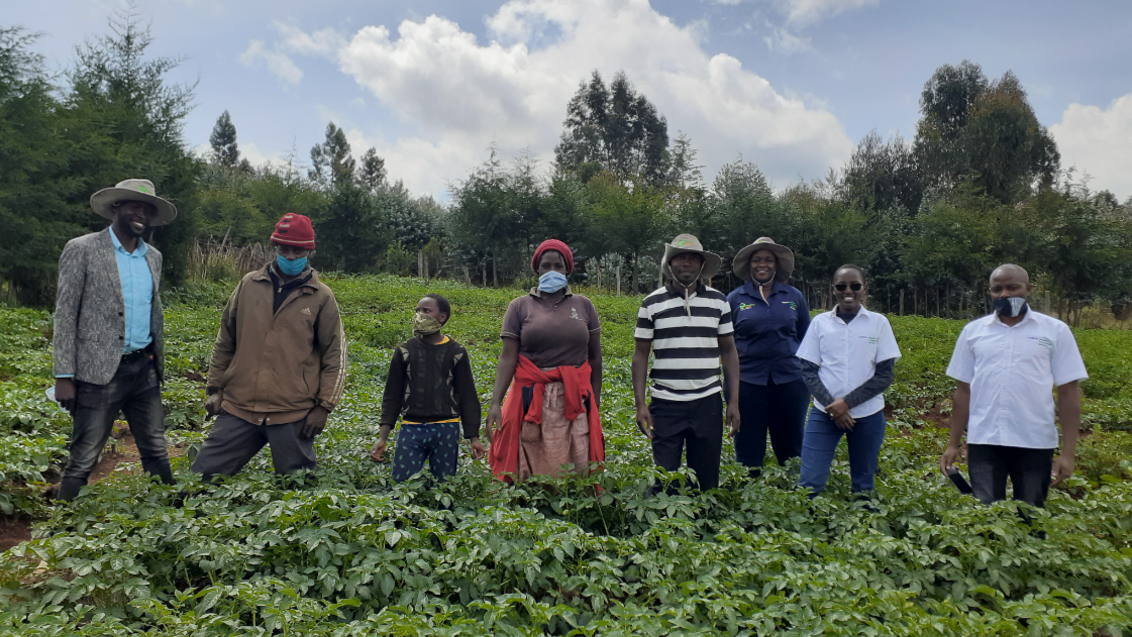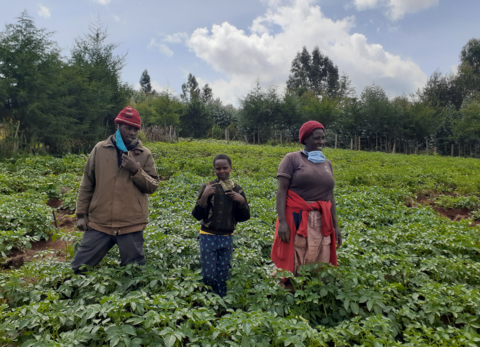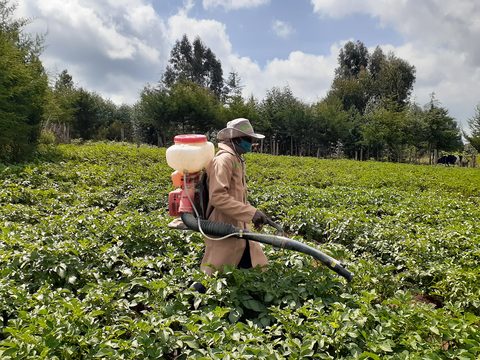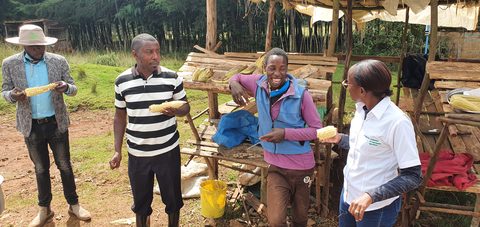Successful family business follows Farmers' Hub ways

A Kenyan family has internalized the Farmers' Hub (FH) model. Members of the household are involved in various activities within the Hub. This helps the family generate sustainable income.
Margaret Gicheha owns Gichaka FH, located in Nyandarua County. She currently offers Hub services directly to more than 50 nearby farmers and indirectly to another 100. Margaret explains: ‘’I was recruited, trained and linked to a network manager as one of the lead farmers within my area to create a one-stop-shop for farming inputs.” Farmers in her community used to travel the long distance into town to purchase good products and hear about better farming practices. Now they can avoid the trek and come to the local FH.
The system is well organized: “Farmers ask for inputs like new seed varieties based on information they get from the radio, for example", adds Margaret. "When they ask if I can get them, I place orders with the network manager. This lets me supply what's needed at the right time." In the last couple of months, she has provided customers with highly demanded inputs of seeds, fertilizers and crop protection chemicals.
In order to support farmers better and succeed, Margaret decided to involve family members. They help deliver sales and manage farm demos. “It is better value for me to engage my own family than hire laborers", she says.
The family is well organized and everybody has her or his own role. Margaret provides inputs to farmers, as well as advice based on years of experience as a potato farmer. She does not charge the farmers for this service. She is currently exploring further opportunities to instil confidence and create awareness of other FH services.
Through collaboration with our Foundation, Margaret has set up a demo site that showcases new crop varieties. When we wrote this portrait, she was running demos of new potato varieties from Agrico and beans from KALRO. Farmers can adopt these as a rotational crop. They come to the demo site to learn about best agricultural practices and get a glimpse of new varieties' performance in the field.
Margaret’s husband offers land preparation services. He hires out his tractor to Margaret’s farmers at a fee. Most of the farmers use manual labor for land preparation which is less efficient. The rental option enables farmers to benefit from mechanization even though they could not afford the investment in equipment of ther own.
Margaret’s eldest son is the family’s “triple-agent”, working as a marketer, delivery agent and contract sprayer. For a small fee, he offers motorbike delivery of the inputs that farmers order from his mother. While on his delivery round, he takes the opportunity to promote other products and services offered by the FH. He also provides spraying services with motorized equipment, a more efficient option than farmers' conventional manual sprayers.
The younger son has set up a “tuck shop" at the roadside next to their homestead, where he sells produce from the family farm. Passersby and road travelers can enjoy fresh ready-cooked snacks and produce on the go. Town and city dwellers are keen buyers at roadside stands across the country, because the prices are lower than in urban areas.
Margaret takes pride in keeping all her children gainfully occupied, especially during the COVID-19 pandemic. She has used the opportunity of lockdown to teach the next generation entrepreneurial ways and induct them into the family business. Even the youngest daughter is already showing business potential - she nows rears pet rabbits for sale.
“Previously we were subsistence farmers", remembers Margaret, "At times we sold our products to the local market, but that brought little income. Members of my household have benefited financially since the inception of the Hub business. Our farming practices have also improved with access to quality inputs. Everybody benefits by gaining income in all the FH activities. Our farmers are celebrating better and reliable access to good inputs."
Margaret concludes by saying: “I use the revenue to meet our household’s needs, feeding my family and paying school fees. I aim to make more sales as I progress with the business; it is already sustaining us well”.
Syngenta Foundation East Africa, through its Agriservice stream, is reaching smallholders through rural entrepreneurs referred to as Farmers’ Hubs, each serving a set of 100 to 200 farmers. Each FH acts as a one-stop-shop for several agricultural. Services include access to:
- Agri inputs - Seeds, crop protection, soil analysis, fertilizer, financing and insurance
- Mechanization:
- Markets for produce
- Advisory services, training and demos



